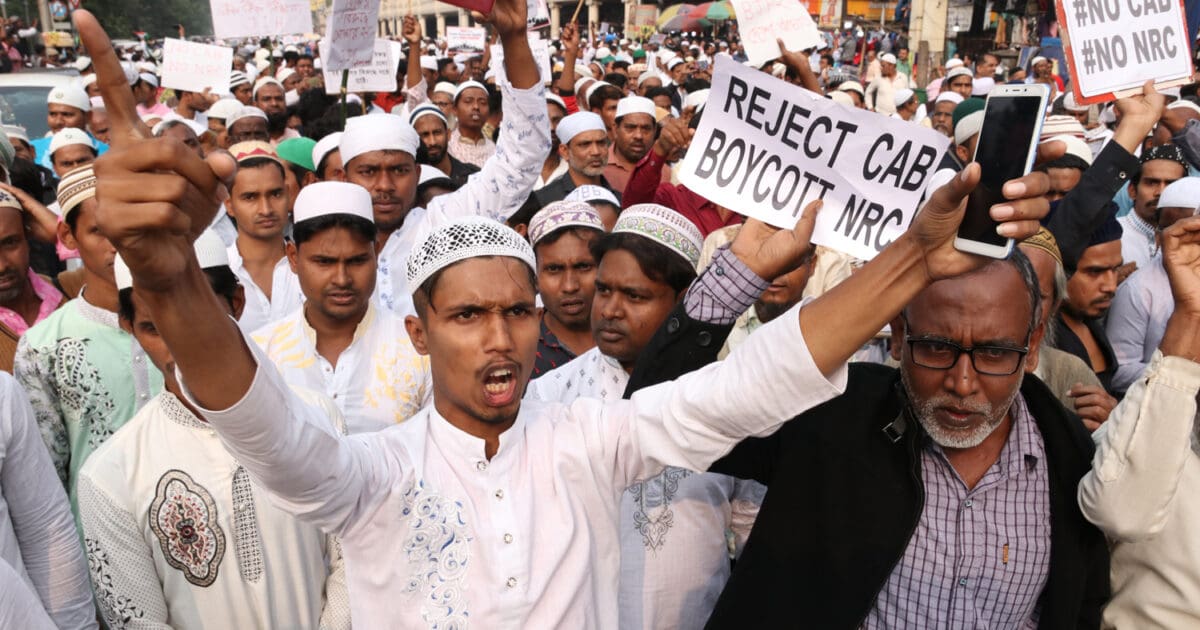In a bold and decisive effort to address the escalating Islamic demographic imbalance, Assam, a small but influential Indian province, is on the verge of introducing and implementing a transformative bill that will outlaw polygamous marriages.
Himanta Biswa Sarma, the incumbent Chief Minister of Assam, declared that the state is poised to enact this historic and groundbreaking bill on February 4, 2024, aimed squarely at prohibiting polygamy. This significant announcement came during his address at Agenda Aajtak on December 14, 2023, as he engaged in a discussion with a television reporter.
According to official briefings, the Assam government received 149 public submissions on the proposed legislation to ban polygamous marriages. The bill garnered widespread support, with 146 of these responses endorsing the measure, reflecting substantial public approval. In contrast, only three organizations registered their opposition to the bill.
The Assam government, led by The Bharatiya Janata Party (BJP), initiated a public consultation for the polygamy prohibition bill from August 21, setting an August 30, 2023, deadline for responses via mail and email. The state administration formed an expert panel to evaluate the legal feasibility of this legislation within the current legal framework. After thorough consultations, this panel presented an affirmative report to the Chief Minister, confirming the state assembly’s legal capacity to enforce the ban on polygamous marriages in Assam promptly.
The term ‘polygamy’ typically refers to the practice of having multiple wives simultaneously and is often associated with Muslims. In contrast, polygamy is not practiced among Christians, Hindus, Sikhs, and Buddhists in India and is considered illegal for non-Muslims. Among the urban, educated middle-class non-Muslim population in India, there is a noticeable decline in marriage rates and an increase in divorces. Conversely, the Muslim population has been consistently growing, a trend mainly attributed to the practice of polygamous marriages within the Islamic community.
This initiative, which is scheduled for implementation in Assam next year, will impact only the Muslim community in the province, as other religious communities do not practice polygamy.
The opposition and objections from Muslims regarding the implementation of uniform civil and marriage laws in India represent a significant roadblock to ‘Population Jihad.’
Under the Indian Penal Code (IPC), polygamy is illegal. Additionally, the Hindu Marriage Act of 1955 explicitly states that polygamy is void and illegal for Hindus, Buddhists, Jains, and Sikhs.
However, Muslims have long reaped the benefits of separate marriage laws. In India, under Islamic law (Sharia), a Muslim man is permitted to have up to four wives, as stated in Quran 4:3. The Quran further allows polygamy for Muslim men who can treat their wives fairly (Quran 4:129). Particularly in matters of marriage and divorce (Quran 66:5), Muslims in India follow Sharia, not the country’s democratic Constitution.
In India, the Muslim Personal Law (Shariat) Application Act of 1937 governs polygamy among Muslims. This law legalizes the practice and establishes marriage, divorce, and inheritance guidelines. This legislation has significant consequences, as it permits Muslim men in India to marry up to four or more wives, potentially leading to a disproportionately high number of offspring and contributing to various social imbalances over time. Muslim groups and organizations in India have consistently defended polygamy as a crucial aspect of their Islamic religious identity and freedom, often opposing any state or judicial attempts to modify personal laws. This resistance has been evident in their opposition to numerous petitions aimed at abolishing polygamy.
Back in 2016, the All India Muslim Personal Law Board (AIMPLB) also vigorously defended polygamy, saying it ‘meets social and moral needs and the provision for it stems from concern and sympathy for women.’ The board, which represents Muslims in India, stated at that time, ‘The Quran, Hadith, and the consensus view allow Muslim men to have up to four wives.’
India’s debate over polygamy is also intertwined with the push for a Uniform Civil Code (UCC), a proposed law aimed at replacing the diverse laws of different religious communities with a single, comprehensive law governing family life. Supporters of the UCC, mainly non-Muslims, argue that it would foster equality, justice, and secularism in the country, ending discrimination against women under Islamic personal laws. These laws currently allow a Muslim man to marry up to four wives and to divorce them swiftly, as per Sharia.
However, Muslims in India who are opposed to the UCC point out that it would be in conflict with the right to freedom of religion under the Constitution and would lead to a majoritarian, homogenous culture imposed on them in a pluralistic society. If the UCC is passed formally, it would mean that throughout India, Muslim men would no longer be able to practice polygamy, which would be a massive setback in the Islamic scheme of “Population jihad.” Within Muslim communities in India, the practice of polygamous marriages with cousins is common. This results in larger families, which further distorts the balance of demographics. In any democratic society, representation is an important guarantee and cornerstone of fair governance.
As it stands, the Uniform Civil Code has not been implemented, and the status quo regarding polygamy, particularly in the context of Muslim practices, remains unchanged at the national level.
However, commendable and bold initiatives are underway at the state or provincial level. Assam is taking a leading role by moving to ban this practice, thereby setting a precedent for other provinces in the country. Additionally, Assam has been at the forefront of combating Islamic jihad. The state has actively conducted thorough investigations into illegal madrassas, which are often seen as hotbeds of Jihadi ideologies. It’s also important to note that Assam has long faced the threat of illegal Bangladeshi Rohingya Muslim immigrants, who frequently manage to infiltrate the state.
Ending polygamy for Muslims: The critical game changer to ensure and safeguard demographic equilibrium
By actively discouraging the practice of Muslim polygamy, societies can achieve a more balanced demographic distribution. When one specific community, like Muslims, is permitted to dominate demographically, it can lead to disproportionate influence for that community. Such an imbalance can result in disastrous outcomes.”
Implementing a permanent ban on polygamy, particularly among Muslims in India, is a critical game changer in preventing the demographic dominance of a single community within a geographical area. This strategic measure by the state of Assam is pertinent given the current Muslim immigration crisis in Europe. The practice of polygamy among specific immigrant communities, like Muslims, can gravely exacerbate demographic disparities, reducing native populations to minorities in their own lands.
Therefore, it is both pertinent and urgent for governments in the West and Europe to take a leaf out of Assam’s book and consider enacting similar bills, laws, and legislation within their constitutional frameworks. Such measures would regulate the marriage practices of Muslim communities, ensuring a balanced and inclusive democratic environment. Moreover, they would be instrumental in mitigating the substantial risk of one particular religious group exerting dangerous influence over all other (non-Muslim) classes.
Sources:
- https://www.legalserviceindia.com/legal/article-4909-practices-of-polygamy-under-muslim-law-in-india.html
- https://www.hindustantimes.com/india-news/muslim-personal-law-board-opposes-supreme-court-petition-that-seeks-to-end-polygamy/story-K5m63xNyJk6nwKXokmjztO.html
- https://timesofindia.indiatimes.com/india/Ban-on-polygamy-encourages-illicit-sex-muslim-law-body-tells-Supreme-Court/articleshow/53987666.cms
- https://rairfoundation.com/indias-escalating-battle-against-jihad-stepping-up-fight/
- https://www.indiatoday.in/india/story/assam-police-arrests-8-for-allegedly-helping-illegal-entry-of-rohingyas-into-india-2414349-2023-07-31
- https://www.republicworld.com/india/breaking-assam-to-table-bill-for-banning-polygamy-in-february-2024/
- https://ianslive.in/assam-to-introduce-bill-to-ban-polygamy-in-february–20231216093606














Even if you outlaw polygamy, the heathen will still do it. In Utah, the fundamentalist mormons built secret hidden rooms in their houses to hide their extra wives. I know this is a fact since my father told me the house he lived in had been built by mormons way back in time, and it had secret rooms and passages. Polygamy was illegal, but they still found ways to do it.
Still the idea to criminalize polygamy is smart. Who wants a bunch of subversive heathen breeding to a majority in a couple decades? It is absolutely smart and enforcement will be key to dissuading this abomination!
Why would any man is his right mind want to have more than one mother-in-law?
Polygamy is hypocritcal; in practice it is no different than keeping a concubine or two, apart from one’s wife. It’s impossible to treat several extra wives equally.
Also, many Muslims marry double first cousins, which leads to inbreeding and a high number of birth defects and genetic problems.